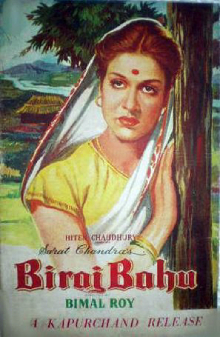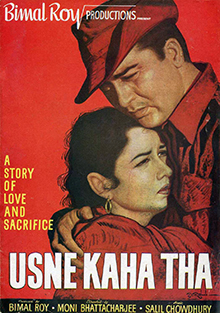Related Research Articles

Bandini is a 1963 Hindi drama film directed and produced by Bimal Roy.It stars Nutan, Ashok Kumar and Dharmendra. The film tells the story of a woman prisoner serving life imprisonment for murder, Kalyani, the all suffering, selfless, sacrificing and strong, yet weak Indian woman. She must make a choice between two very different men, Devendra (Dharmendra), the loving prison doctor, and Bikash, a man from her past.

Sunil Dutt was an Indian actor, film producer, director and politician. Dutt was honoured with Padma Shri, in 1968, by the Government of India, for his contribution to Indian cinema.
Bimal Roy was an Indian film director. He is particularly noted for his realistic and socialistic films such as Do Bigha Zamin, Parineeta, Biraj Bahu, Devdas, Madhumati, Sujata, Parakh and Bandini, making him an important director of Hindi cinema. Inspired by Italian neo-realistic cinema, he made Do Bigha Zamin after watching Vittorio De Sica's Bicycle Thieves (1948). His work is particularly known for his mise en scène which he employed to portray realism. He won a number of awards throughout his career, including eleven Filmfare Awards, two National Film Awards, and the International Prize of the Cannes Film Festival. Madhumati won 9 Filmfare Awards in 1958, a record held for 37 years.

Penmetsa Ram Gopal Varma, often referred to by his initials RGV, is an Indian film director, screenwriter and producer, known for his works in Telugu cinema in addition to Hindi, Kannada language films, and television. Varma has directed films across multiple genres, including parallel cinema and docudrama noted for their gritty realism, technical finesse, and craft. Regarded as one of the pioneers of new age Indian cinema, he was featured in the BBC World series Bollywood Bosses in 2004. In 2006, Grady Hendrix of Film Comment, published by the Film at Lincoln Center cited Varma as "Bombay's Most Successful Maverick" for his works on experimental films.

Salil Chowdhury was an Indian music director, songwriter, lyricist, writer and poet who predominantly composed for Bengali, Hindi and Malayalam films. He composed music for films in 13 languages. This includes over 75 Hindi films, 41 Bengali films, 27 Malayalam films, and a few Marathi, Tamil, Telugu, Kannada, Gujarati, Odia and Assamese films. His musical ability was widely recognised and acknowledged in the Indian film industry. He was an accomplished composer and arranger who was proficient in several musical instruments, including flute, the piano, and the esraj. He was also widely acclaimed and admired for his inspirational and original poetry in Bengali.

Akkineni Laxmi Vara Prasada Rao, known professionally as L. V. Prasad, was an Indian film director, producer, actor, and businessman. He was one of the pioneers of Indian cinema and is the recipient of the Dadasaheb Phalke Award, the highest Award for films in India. In 1980, he was awarded the Raghupathi Venkaiah Award, for his contribution to Telugu cinema.

Devdas is a 1955 Indian Hindi-language period drama film directed by Bimal Roy, based on the Sarat Chandra Chattopadhyay novel Devdas. It starred Dilip Kumar in the title role, Suchitra Sen in her Bollywood debut as Parvati "Paro", Vyjayanthimala in her first dramatic role where she played tawaif named Chandramukhi. Motilal, Nazir Hussain, Murad, Pratima Devi, Iftekhar, Shivraj were playing other significant roles along with Pran, Johnny Walker in extended cameo appearances.

Bhupinder Singh was an Indian musician, a ghazal singer and also a Bollywood playback singer.

Biraj Bahu is a 1954 Hindi film produced by Hiten Choudhury and directed by Bimal Roy, and based on a Bengali novel by Saratchandra Chattopadhyay. The film stars Kamini Kaushal, Abhi Bhattacharya and Pran and has music by Salil Chowdhury. The film won the All India Certificate of Merit for Best Feature Film.

Mujhe Jeene Do is a 1963 Indian Hindi film, directed by Moni Bhattacharjee and written by Aghajani Kashmeri. This dacoit drama stars Sunil Dutt, Waheeda Rehman, Nirupa Roy, Rajendranath and Mumtaz.
Jaidev was a music composer in Hindi films, most known for his work in films: Hum Dono (1961), Reshma Aur Shera (1971), Prem Parbat (1973), Gharaonda (1977) and Gaman (1978).

Amit Bose was an Indian filmmaker, film director and editor, who directed all-time classics like Abhilasha (1968) and, as an Editor, worked on movies like Madhumati (1958), Sujata (1959), Parakh (1960), Usne Kaha Tha (1960), Kabuliwala (1961), Prem Patra (1962), Bandini (1963) and Shakespeare Wallah (1965). He worked as Chief Film Editor for Bimal Roy and with several other directors including Sanjay Khan.

The 17th Cannes Film Festival was held from 29 April to 14 May 1964. On this occasion, the Palme d’Or was renamed "Grand Prix du Festival International du Film", a name that remained in use through 1974, after which it became the Palme d'Or again.
Tarun Bose was an Indian actor, active in Bollywood during the 1960s and 1970s.
Chandradhar Sharma Guleri was a writer and scholar of Hindi, Sanskrit, Prakrit and Pali from Jaipur, India. He was born in Jaipur and his father belongs to Guler village in Himachal Pradesh hence "Guleri" at the end of the name. Described as a versatile genius, he is known as the author of Usne Kaha Tha, first published in 1915, which is debated to be the first short story in Hindi. He is also remembered for his efforts to preserve the Jantar Mantar Observatory in Jaipur.

Syed Wajid Hussain Rizvi, better known by his film screen name, Agha Jani Kashmiri, was an Indian screenwriter, former actor and Urdu poet.

Usne Kaha Tha is a 1960 Bollywood drama film directed by Moni Bhattacharjee starring Sunil Dutt and Nanda in lead roles. This film is Bhattacharjee's first independent directorial venture. He had previously assisted Bimal Roy on various films, notably Madhumati and Do Bigha Zameen. Bimal Roy produced this film under his banner "Bimal Roy Productions".
Sudhendu Roy (1921–1999) was a noted Indian film director, art director and production designer in Hindi cinema, most known for his realistic art direction in auteur Bimal Roy's films, like Sujata (1959), Madhumati (1959) and Bandini (1963), and glitzy work in films Subhash Ghai's Karz (1980) and Karma (1986) to Yash Chopra's Silsila (1981), Chandni (1989) and Lamhe (1991). He won the Filmfare Award for Best Art Direction thrice for, Madhumati (1959), Mere Mehboob (1964) and Sagina (1975).
Kamal Bose (1915–1995) was an Indian cinematographer, who shot most of Bimal Roy classics, including Parineeta (1953), Do Bigha Zamin (1953), Bandini (1963), Devdas (1955) and Sujata (1960). He successful transitioned into the coloured film era, and shot Qurbani (1980), Janbaaz (1986) and Dayavan (1988).
Indrani Mukherjee is an Indian actress who worked in Hindi films during the 1960s and 1970s and starred in over 70 films. After playing the heroine in some films, notably Usne Kaha Tha (1960) and Aakhri Khat (1966), she moved to playing character roles which were central to the film and made this her forte. Her roles in films like Dharam Veer (1977), Parvarish (1977) and Des Pardes (1978) were the pivot of the storyline, but they were not conventional heroine roles. Each of the movies were a success at the box office.
References
- ↑ "Usne Kaha Tha 1961". The Hindu . 29 November 2008. Retrieved 13 December 2018.
- 1 2 Bharatan, Raju (1969). "Indian Film Scene". The Illustrated Weekly of India . 9 (3): 47.
- 1 2 3 "Mujhe Jeene Do (1963)". The Hindu. 13 May 2010.
- 1 2 Official Selection 1964 Cannes Film Festival
- ↑ Link. United India Periodicals. 1963. p. 37. Retrieved 11 January 2012.